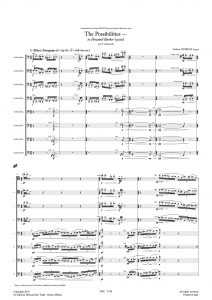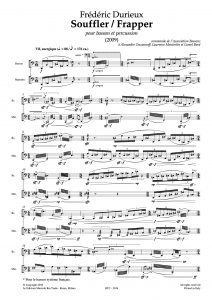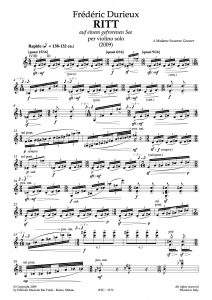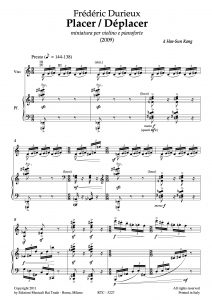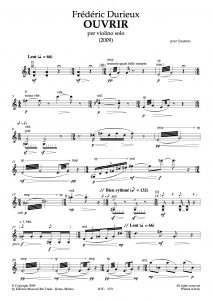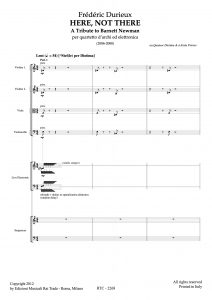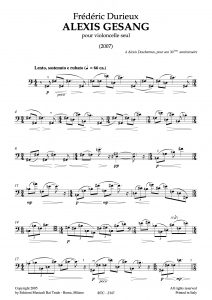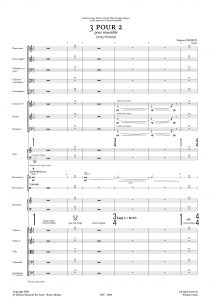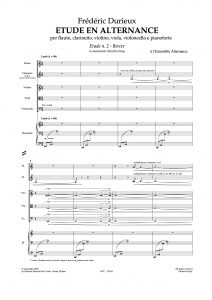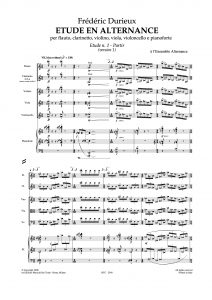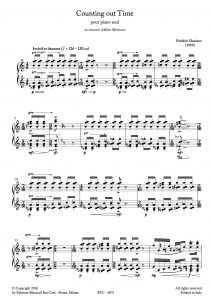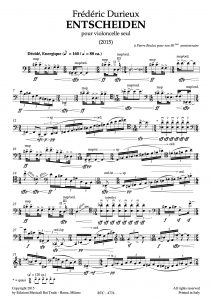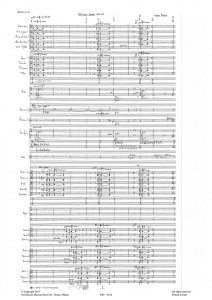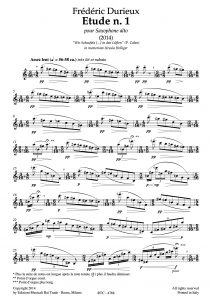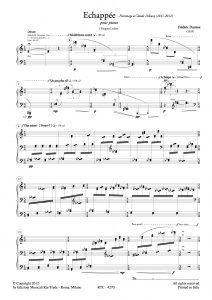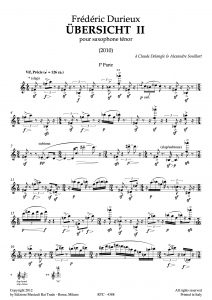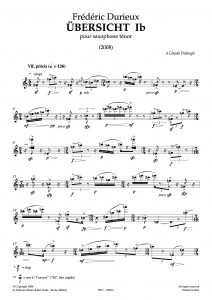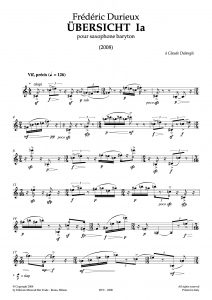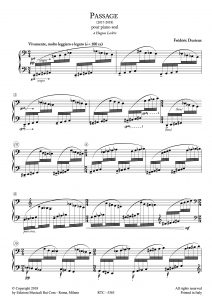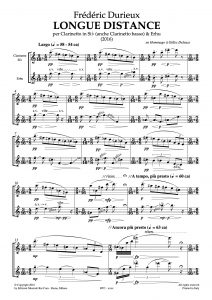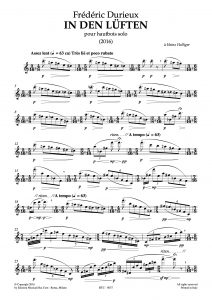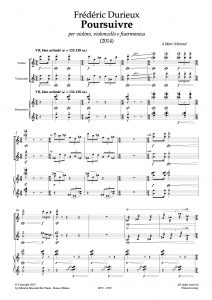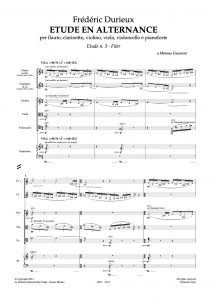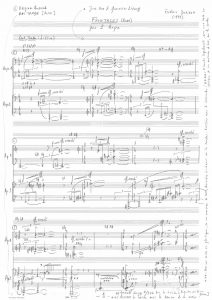Nato il 27 febbraio 1959 a Parigi, Frédéric Durieux ha iniziato a studiare il pianoforte a 5 anni. Ha proseguito la propria istruzione musicale al Conservatorio di Grenoble (armonia e contrappunto), al Conservatorio di Parigi (analisi e composizione) e all’IRCAM.
In residenza a Villa Medici a Roma (1987-89), completò la prima composizione per ensemble ed elettronica, Parcours pluriels (1987-88), co-commissione di Ensemble Intercontemporain e IRCAM.
I lavori di Durieux sono stati eseguiti in Europa, Asia e Nordamerica. Il suo catalogo include più di 50 lavori, per voci, soli, gruppi da camera, ensemble e orchestra, live electronics.
Espressive e costruite con rigore, le partiture di Frédéric Durieux hanno frequenti riferimenti a lavori poetici (Bonnefoy, Hoquard, Celan, Hoelderlin, Nobuo e Beck) o teatrali (Barker, Beckett). Anche le arti visive sono fonte di ispirazione, in particolare quelle di Barnett Newman, Cy Twombly o Christian Boltanski.
Conscio della necessità di articolare il proprio pensiero estetico-musicale, Frédéric Durieux ha scritto numerosi articoli: suoi scritti e interviste sono raccolti nel volume “L’esapce des possibles”, uscito nel 2019 per Éditions Aedam Musicae.
Durieux è anche molto attivo come pedagogo. È stato professore di scrittura musicale contemporanea e analisi presso il DEA (CNRS/EHESS/IRCAM), e di analisi al Conservatorio di Parigi. Dal 2001 insegna composizione al Conservatorio di Parigi (CNSMDP). Con il musicologo e traduttore Laurent Feneyrou ha diretto il seminario di Composizione e Musicologia del CNSMDP/CNRS. Ha inoltre preso parte a numerosi seminari, workshop e masterclass in Europa, Asia e Nord America.
Oltre al francese, Durieux comunica e insegna in tedesco, italiano e inglese. Vive e lavora a Parigi.
Born on 27 February 1959 in Paris, Frédéric Durieux began piano lessons at the age of 5. He continued his musical education at the Conservatoire national de région in Grenoble (harmony and counterpoint), earning there a gold medal in Harmony (1981). He was admitted to the Conservatoire national supérieur de musique et de danse de Paris (CNSMDP) in 1982, where he obtained a First Prize in analysis in 1984 in the class of Betsy Jolas, as well as a First Prize in composition in 1986 in the class of Ivo Malec. At the same time, he was selected by the Ensemble InterContemporain for an initial concert in 1985, and continued his training at IRCAM in the Musical research department (1985-85). During a residency at the Villa Medici of Rome, where he spent two years (1987-89), he completed his first score for ensemble and electronics, Parcours pluriel (1987-88), jointly commissioned by Ensemble InterContemporain and IRCAM. He realised the electronic component in the studios of IRCAM and of the Villa Medici.
Frédéric Durieux has received numerous commissions; his works are played in Europe (France, Italy, Austria, Switzerland, Germany, United Kingdom, Sweden, Norway, Spain, Portugal), in Asia (Japan, China and South Korea), as well as in North America (USA, Canada, Mexico). His catalog includes over 50 scores, for voices, soloists, chamber groupings, ensemble and orchestra, with and without electronics.
Expressive and rigorously constructed, the scores of Frédéric Durieux make frequent references to poetic works (Yves Bonnefoy, Emmanuel Hoquard, Paul Celan, FriedrichHölderlin, Ayukawa Nobuo and Philippe Beck) or to the theater (Howard Barker, Samuel Beckett). The visual arts are also a source of inspiration, notably those of Barnett Newman, Cy Twombly or Christian Boltanski.
Mindful of the need to articulate his musical and aesthetic thinking, Frédéric Durieux has written numerous articles since 1986. The totality of his writings and interviews was published under the title L’espace des possibles, issued in 2019 by Éditions Aedam Musicae.
Frédéric Durieux is also intensely active as a pedagogue. From 1990 to 1995, he was professor of contemporary music writing and analysis in the contemporary music DEA (CNRS/EHESS / IRCAM), directed by Hugues Dufourt. From 1990 to 1999 he taught analysis at the Conservatoire de Paris, initially for instrumental students, and later the Advanced analysis class. Since 2001, he has taught composition at the Conservatoire de Paris (CNSMDP). With the musicologist and translator Laurent Feneyrou, he co-directed the Contemporary composition and musicology‘ seminar at the CNSMDP / CNRS. Between 2008 and 2011, he participated in several seminars at the Ecole nationale supérieure d’architecture de Versailles, as part of the workshops of Christian Hauvette and Richard Scoffier. Between 2017 and 2018, he took part in a storytelling atelier with screenwriting graduates of the Fémis, and composition students of the CNSMDP. He has given numerous conferences and masterclasses in Europe, Asia, and in North America (Germany, Austria, China, South Korea, USA, France, Italy, Japan, Mexico, Norway, United Kingdom, Sweden, Switzerland).
Durieux received the Prize of the Prince Pierre of Monaco Foundation in 2010, and, in 2016, the Florent Schmitt Prize of the Academy of Fine Arts (French Institute). He is an Officer of the Order of Arts and Letters (France).
Marked by, and drawn towards Italian, Germanic and English cultures, Frédéric Durieux communicates and teaches in German, Italian and English. He lives and works in Paris.

